- Home
- Rebecca York
Christmas Miracle 1935 Page 5
Christmas Miracle 1935 Read online
Page 5
When she left again, Sophie felt like Christmas had come early. The only thing she needed now was. . . .
She couldn’t hold back a little choking noise, and Dora looked up with concern. “What’s wrong dear?”
“I was just thinking about my father. If we could just get him home for the holiday, everything would be perfect.”
“It will work out.”
“I wish I could be sure,” Sophie answered, but she didn’t want to continue the conversation, and Dora didn’t press her.
After a quick lunch, they packed what she was taking into feed bags and wooden boxes and separated out other things that could go to several local churches that collected donations for families in need. After getting everything out of the room, Sophie gave it a good dusting and vacuuming, then remade the bed with sheets, a wool blanket and a comforter.
It was dark by the time she had finished. Turning on the bedside lamp, she looked at the space with satisfaction. This might be the smallest bedroom in the house, but it was warm and cozy, better than her room at home which was a sort of lean-to sticking out from the house.
“My goodness. You’ve gotten a lot done,” Hannah said when she came back to see the progress. “All you need are some pretty curtains. To go over the shades.”
“You don’t have to go to any trouble,” Sophie said.
“I want you to be comfortable here. But now, why don’t we run the things you want over to your house,”
“Are you sure?”
“Yes. It will get them out of the way. And while we’re gone, the men can put the donation pile in the barn. Then the room will be all ready for you tonight.”
“I’d like to take the pile over here.” Sophie pointed to some of the bags and boxes she’d set in the hall.
Hannah picked up one of the feed bags.
“Should you be doing that?” Sophie asked.
“The doctor said I’m strong and healthy. My only problem is . . .” She stopped talking when Jenny came down the hall.
“Emeline wants to know what your problem is,” she said.
“That sometimes I don’t feel too well in the morning.”
“Why not?”
“I think it’s a passing inconvenience,” she answered.
Jenny chewed on that, but she didn’t ask another question.
Apparently, Hannah had already alerted the men, because Mr. Conway, Jack’s father, and Jack all showed up.
“We’ll help you carry things to the car before we take the rest to the barn,” he said. “This is the pile that’s going to the Garretts?” Jack’s father asked.
“Yes.”
The two older men picked up boxes. When they had left the room, Sophie put a hand on Jack’s arm to hold him back for a moment. She felt his muscles jump under her hand and wished she could turn him toward her. She wanted to hug him, but she only said. “Are you OK?”
He flushed. “Uh huh.”
“I have a way for you to think about the accident,” she said softly.
“What?” he challenged.
“How about, anybody else who fell in that well would have plummeted to the bottom. But you were quick enough to save yourself.”
He made a noncommittal sound, but she could see that he was considering the idea. She wished they could have more time alone together. She’d like to make sure he understood how thankful she was that he had come out of that well alive. But someone could walk in on them here at any moment. Still, he laid a hand on her shoulder and lingered there for a moment.
She gave him a quick look before picking up one of the bags. He took a box, and they walked to the car together.
After all the bags and boxes were loaded, Hannah slipped behind the wheel, and Sophie got into the passenger seat for the drive to the Garrett house.
“Thank you for being willing to stay at the farm,” Hannah said.
“I’m glad to do it. I just feel bad about not being with my family.”
“We’ll make sure you have plenty of opportunity to get over there.”
“Thank you.”
When the car pulled up, Momma came out with a questioning look on her face, the boys right behind her.
“We thought you wasn’t coming back,” Harold said.
“Weren’t coming back,” his mother corrected.
“We cleaned out the room where I’m going to sleep, and we found a lot of things we all might want.”
“Like what?” Evan challenged.
“Like some toys for you and Harold. And a lot of things for Momma. Why don’t you help us carry it in?”
The boys did most of the work, and Sophie wished she could stay to see Momma’s reaction to some of the finds—like a spread that would make a good replacement for the faded one on her bed. But at the same time, she didn’t want to bring Hannah into the house where she could see how poor they were.
“We’d better go. I still have to fix dinner,” she said, thinking she’d be better off falling into bed after the day of sorting and cleaning.
When they turned back toward Highland Farm,” Hannah said, “You probably don’t know it, but after my father died, I was living on a farm with my aunt and uncle before Matt hired me to take care of Jenny.”
“No, I didn’t know,” Sophie answered in surprise.
“My aunt and uncle resented having to take care of me, and they made me pay for my room and board by giving me a lot of jobs on their miserable little farm.”
Sophie blinked, wondering why Hannah was telling her all this.
“I understand better than you think,” she continued. “I know what’s it’s like to suddenly have your father disappear. And I’m sure I was living in far worse conditions than on your farm.”
Sophie didn’t know how to answer, and she was saved from dredging up a reply when they arrived back at Highland Farm and Jenny came running out to meet them.
As it turned out, she didn’t have to make dinner. Dora had prepared the meal while she’d been packing the items from her bedroom. And now the only job left was putting the food on the table in the dining room.
It was strange sitting down to dinner with the Conway family. But this was going to be her life for a while now, and she told herself to get used to it.
Chapter Ten
Jack nailed another piece of lath to the partially finished wall of his old house. With the cold weather, there was less work to do on the farm, which gave him the opportunity to work on his dwelling.
The wall would be ready for plaster soon, and he was thinking that if he got a good fire going in the fireplace, it would be warm enough to do the plastering. It was the last wall of the main room that needed to be finished. He wasn’t sure what he thought about having Sophie living at Highland Farm. On the one hand, she’d been the major observer at the worst screwup of his life. Until falling in the well, he’d thought the worst thing that had ever happened to him was at school recess. He’d been seven, and he’d seen something moving in the woods. When he’d dashed over to see what it was, he’d gotten sprayed by a skunk.
The stink had been horrible, and all the kids had been holding their noses and shouting, “phew” or “pee-yew” at him.
The teacher wouldn’t let him back into the classroom. He’d had to walk home, and when he got there, the reaction at the farm was a version of what he’d endured at school. Momma had stripped off his clothes in the yard outside their farmstead and wrapped them in a feed sack. Then she’d gotten him into a tub of water and washed the bejesus out of him with strong soap. And he’d learned never to get near a skunk.
He’d felt stupid and humiliated, and he’d vowed never to do anything that would earn him ridicule. And then he’d thought he would get a head start on clearing away the fallen tree. Instead of a head start, he’d spent hours in the well, clinging to the side, wondering if he was going to make it out alive.
He wished his father had found him. Maybe Dad wouldn’t have had to tell anyone else. But instead it had been Sophie hurrying up the hi
ll to rescue him. She’d done everything she could to save him. The worst part of the whole experience was hobbling back down the hill with her and having everybody crowd around to see what he’d done to himself.
He had enough self-awareness to understand he was adopting a pretty juvenile view of the mishap. Maybe it was because he’d been too full of himself. He’d been enjoying the status of farm manager. He knew he’d been acing the job. Then he’d gone and done something that made him feel as stupid as the kid who’d had a run-in with a skunk.
And Sophie had been right at the center of it. He hated coming off as incompetent in front of her. On the other hand, she knew the worst about him, and she was still acting interested in him. After he’d made it out of the well, she’d kissed him. That had to mean something—maybe more than that she was relieved and thankful that he wasn’t dead.
He laughed. It had meant more to him. And if he hadn’t lived through that disaster at the well, he would have been excited about her moving to the farm full-time. He was astonished at how his opinion of her had changed. When she’d arrived, he considered her association with her father as a big strike against her. Now he thought she was pretty solid. Probably she was going to make some guy a good wife.
That thought stopped him in his tracks. A good wife? Had his thinking gotten that far? Was he even in a position to contemplate marriage?
He was sleeping on a pallet on the floor and living in a house that he wouldn’t invite a pig to share with him.
He shook his head, sure that his thoughts were getting away from him. He’d better focus on his job and not screw up by almost killing himself again—or any other way.
Maybe to cool down his racing mind, he vowed to stay away from the main house for a couple of days.
####
Sophie was in the living room helping Jenny cut out paper doll clothing when a newspaper that Mr. Conway must have left there caught her eye. On the bottom of the front page was a little article about a burglary.
She blinked.
She kept cutting around the edges of a paper doll Sunday-best kind of dress while she read the text. It was a complaint from several homeowners in Ellicott City whose homes had been broken into. The missing items were mostly small pieces of jewelry, the same things that had been in the bag her father had picked up.
And it was the same crime that her father had been accused of, but he couldn’t have done it because he was in jail.
“Why are you taking so long with that dress?” Jenny demanded.
“Sorry. I was reading something.”
“What?”
“Just something about a house getting robbed,” she answered, not mentioning that there had been more than one incident.
“You don’t think that could happen to us?” Jenny asked anxiously.
“No. It was in Ellicott City. We’re way out in the country.”
She put the paper back on the coffee table, her mind spinning. Finishing the dress, she handed it to Jenny. “Let’s try it on the redheaded doll,” she suggested.
Jenny held the dress up against the young woman and folded the tabs. “It looks good.”
“Yes.”
“Can you cut out a dress for her friend?”
“Sure,” she said. She loved taking care of Jenny, but at this moment, she couldn’t help wishing she could go off and do some thinking.
She began to cut out another dress, but while she worked, she was mulling over the possibilities. The article wasn’t enough to prove that her father hadn’t done it. But what if there was some way for her to investigate the crimes? That would be hard because she didn’t have a car. And what good would it do to ask the people about the incidents? They probably wouldn’t know much except that items were missing.
Of course, there was the feed store. Her father had told her and Momma where he’d found the loot. What if there was more there—from the new robberies?
It would be a long, cold walk down there, but what if she could hitch a ride? Would Jack take her down there?
###
Sophie was still thinking about the half-formed plan when she went to bed. It took a long time for her to fall asleep, and for most of the night she slept soundly. But finally, a dream caught her in its grip.
Somehow in the distortion of reality, she had decided to investigate the robberies by sneaking into one of the houses where the jewelry had been taken.
Even in sleep, she knew it was a dumb move. The house was empty, and she tiptoed from room to room snooping around. When she heard a car pull up in the driveway, she froze, expecting the homeowners to come through the front door. But it wasn’t the people who lived there; it was the police.
She looked wildly around, knowing that if they found her, she would join her father in jail. She wasn’t sure where to hide. But then Jack was beside her, gripping her hand, pulling her toward a pantry that looked a lot like the one at Highland Farm, only there seemed to be a place where they could slip behind the shelves and hide.
Jack pulled her into the narrow space. He was behind her so that she stood in front of him.
“Quiet,” he whispered.
She nodded against him, listening for the sound of men searching the house. When they came to the pantry, she froze, but Jack pulled her back against himself, his strong arms wrapping her in a protective grip. They stood there for long moments, her heart pounding. Then the pantry door opened, and she shrank back against Jack, praying that the cops wouldn’t find their hiding place.
Centuries passed before the door closed again. She and Jack were in the dark, but she knew it wasn’t safe to venture out. She could still hear the cops rummaging through the premises.
Jack bent his head, pressing his cheek to hers, then turning so that he could slide his lips against the line of her jaw.
It felt good, and she caught her breath. She knew he heard her response, because his teeth began to play with her ear. She leaned back against him, arching her back, and his hands stroked her sides, then slowly came around to cup her front.
She couldn’t hold back a small sound, shocked by his touch and yet enthralled by it. She pressed more tightly to him, trapped by the shelves, wanting to turn around so that they were facing.
And then a sound from outside the dream intruded. At first, she didn’t know what it was. Then she recognized a rooster crowing.
She woke, lying in her darkened bedroom. The vivid dream came back to her in all its details, and she clenched her teeth, trying to calm herself.
She’d started out to search one of the burgled houses for clues. Then the dream had provided a reason for her and Jack to be trapped together—where they could . . .
She wasn’t sure exactly what they would have done. But she knew how much she liked being that close to him. Her hands opened and closed. It was probably a mistake thinking about Jack Calvert that way. She was working at Highland Farm, and she’d better keep her mind on her job.
Besides, what if Jack didn’t feel that way about her?
They’d gotten off on the wrong foot. And really, her finding him in the well hadn’t helped. She wished she could just ask him what was happening between them. But of course, she couldn’t. The whole thing was so complicated. She liked him, and now she also wanted him to help her prove her father wasn’t guilty, and the dream had mixed the two things up together.
Chapter Eleven
Sophie had been glancing out the window from time to time. When she saw Jack go into the barn, she said to Jenny, “Why don’t we go feed the barn cats.”
“Keen.”
She gathered up a plate of scraps, then filled a bowl with water. As they got to the barn, Jack was checking the bags of horse feed and making notes on a clipboard.
When he heard Sophie and Jenny talking, he turned around just as they stepped through the big barn door.
Here he was, the man she had dreamed about so vividly. She hoped he wouldn’t notice that she was flushing.
As Jenny set down the plate of food, three c
ats—a tabby, a calico, and a black one—came running, their tails up in the air like flagpoles.
Sophie put down the water. Slowly she stood and turned toward Jack, unable to stop herself from looking at his hands.
Damn. Stop it, she told herself.
To him, she said, “Hi.”
“Hi,” he answered.
Still fumbling for how to proceed, she turned back to the little girl. “Don’t bother them while they’re eating. You could get scratched.”
“I know.” Jenny moved a few feet away, watching the cats. “I wish we could bring one of them into the house.”
“I think we have to just visit them here.”
Jenny looked hopefully at Jack. “Is that what you think?”
“Yes.”
The little girl sighed, then asked. “Do you think black cats are bad luck?”
“No,” Sophie said. “Some people think that, and sometimes they hurt black cats.”
“That’s mean.”
“Yes. We shouldn’t hurt animals.” She looked back at Jack. Finally addressing him, she asked, “How are you?”
“I’m fine.”
He seemed as uncertain as she was. He cleared his throat. “My mom says you’re a big help to her.”
“She’s been a big help to me, too.”
“How?”
At least they seemed to be having a normal conversation. “She’s showing me a lot about cooking and housekeeping.”
“Your mom does those things,” he pointed out.
“Well, we don’t have as good equipment. I never used a vacuum cleaner before. And my mother’s cooking is pretty basic. Dora is showing me all kinds of dishes I never tried before—some I never heard of.”
He nodded. “Momma says you’re a fast learner.”
“She does?”
“Yes. She says your pie crusts are as good as hers.”
She glowed under the praise. “I’m trying my best to do everything right.”
“Don’t get uptight about it. You learn by doing—like I learned the farm work by helping my dad.”
“Uh huh.”
The cats had finished eating, and Jenny had followed them across the barn to a pile of straw where they settled down and began to wash.

 Escape Velocity (Off-World Series, Book 7): Sexy Science-Fiction Romance Novel
Escape Velocity (Off-World Series, Book 7): Sexy Science-Fiction Romance Novel Hunter (Decorah Security Series, Book #20): A Paranormal Romantic Suspense Novel
Hunter (Decorah Security Series, Book #20): A Paranormal Romantic Suspense Novel Christmas Miracle 1935
Christmas Miracle 1935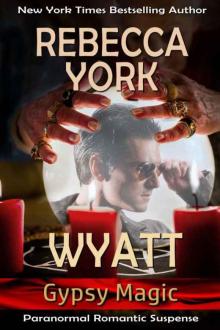 Wyatt
Wyatt Unforgettable Christmas Dreams: Gifts of Joy
Unforgettable Christmas Dreams: Gifts of Joy Hollow Moon
Hollow Moon Cursed: Decorah Security Book #21
Cursed: Decorah Security Book #21 Bedroom Therapy
Bedroom Therapy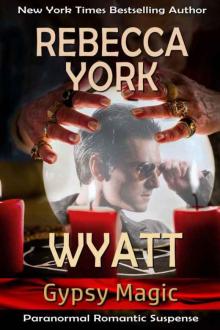 Wyatt (Gypsy Magic Book 1)
Wyatt (Gypsy Magic Book 1) DIAGNOSIS: ATTRACTION
DIAGNOSIS: ATTRACTION Can She Get Home for Christmas
Can She Get Home for Christmas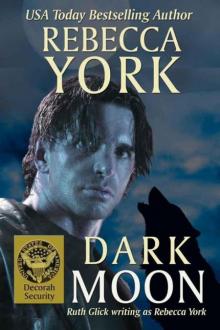 Dark Moon
Dark Moon Found Missing (Decorah Security Series, Book #14): A Paranormal Romantic Suspense Novel
Found Missing (Decorah Security Series, Book #14): A Paranormal Romantic Suspense Novel Fire on the Moon
Fire on the Moon Dark Powers
Dark Powers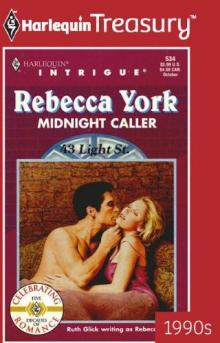 Midnight Caller
Midnight Caller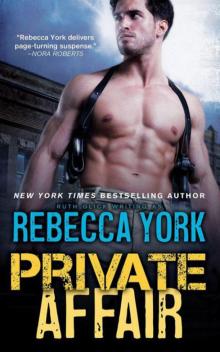 Private Affair
Private Affair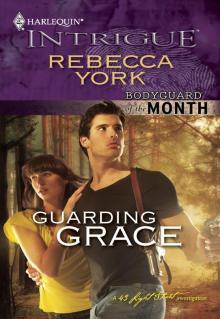 Guarding Grace
Guarding Grace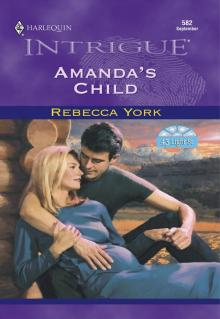 Amanda's Child
Amanda's Child Phantom Lover
Phantom Lover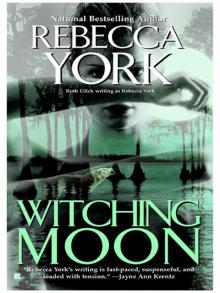 Witching Moon
Witching Moon Talons of the Falcon
Talons of the Falcon Conquest (A Fantasy & Futuristic Romance Short Story)
Conquest (A Fantasy & Futuristic Romance Short Story)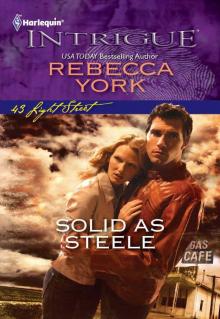 Solid as Steele
Solid as Steele Spellbound
Spellbound The Secret Night
The Secret Night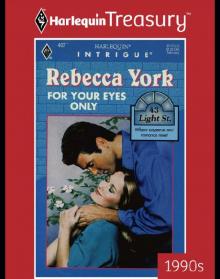 For Your Eyes Only
For Your Eyes Only In Search of the Dove
In Search of the Dove Christmas Spirit
Christmas Spirit Never Alone (43 Light Street)
Never Alone (43 Light Street)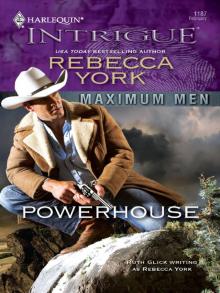 Powerhouse
Powerhouse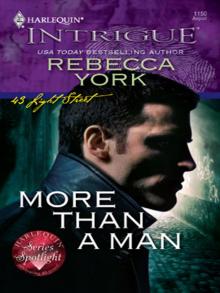 More Than a Man
More Than a Man Boxed In (Decorah Security Series, Book #16): A Paranormal Romantic Suspense Novel
Boxed In (Decorah Security Series, Book #16): A Paranormal Romantic Suspense Novel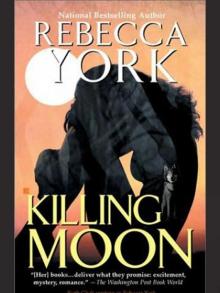 (Moon 1) - Killing Moon
(Moon 1) - Killing Moon Flight of the Raven
Flight of the Raven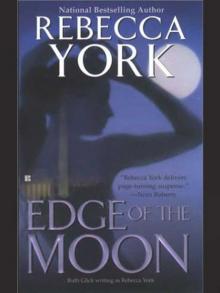 (Moon 2) - Edge of the Moon
(Moon 2) - Edge of the Moon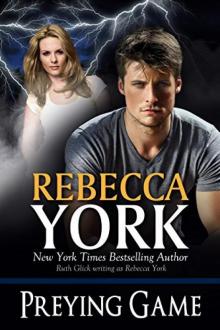 Preying Game (Decorah Security Series, Book #15): A Paranormal Romantic Suspense Novel
Preying Game (Decorah Security Series, Book #15): A Paranormal Romantic Suspense Novel CARRIE'S PROTECTOR
CARRIE'S PROTECTOR Bad Nights
Bad Nights Beyond Fearless
Beyond Fearless Out of Nowhere
Out of Nowhere Undercover Encounter
Undercover Encounter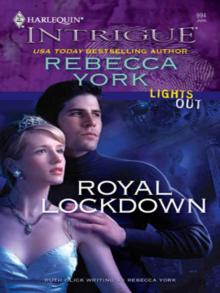 Royal Lockdown
Royal Lockdown Destination Wedding
Destination Wedding Chain Reaction
Chain Reaction Dark Warrior
Dark Warrior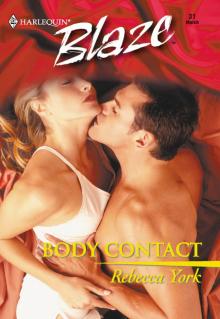 Body Contact
Body Contact Terror Mansion (Decorah Security Series, Book #12): A Paranormal Romantic Suspense Novella
Terror Mansion (Decorah Security Series, Book #12): A Paranormal Romantic Suspense Novella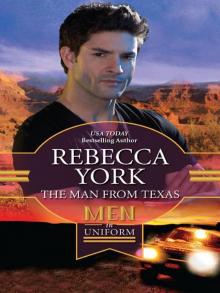 The Man from Texas
The Man from Texas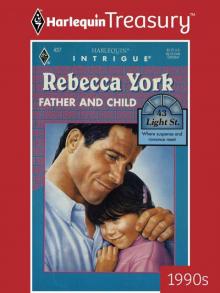 Father And Child
Father And Child THE OFF WORLD COLLECTION (Short, Steamy Science Fiction Romances) (Off-World Series)
THE OFF WORLD COLLECTION (Short, Steamy Science Fiction Romances) (Off-World Series) Sudden Attraction
Sudden Attraction Bedroom Therapy: A Hot Romantic Suspense Novel
Bedroom Therapy: A Hot Romantic Suspense Novel Sudden Insight
Sudden Insight Hero's Welcome (A Fantasy & Futuristic Romance Short Story)
Hero's Welcome (A Fantasy & Futuristic Romance Short Story)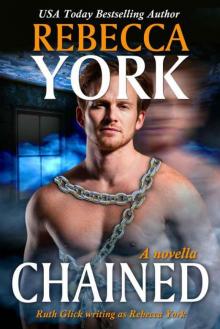 Chained
Chained Desperate Magic
Desperate Magic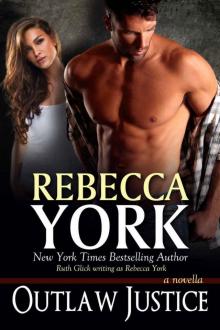 Outlaw Justice (Decorah Security Series, Book #13): A Paranormal Romantic Suspense Novella
Outlaw Justice (Decorah Security Series, Book #13): A Paranormal Romantic Suspense Novella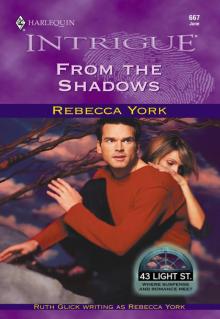 From the Shadows
From the Shadows Dark Magic
Dark Magic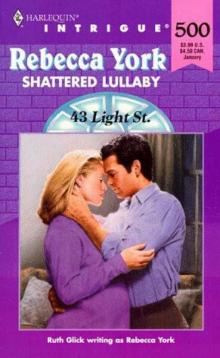 Shattered Lullaby
Shattered Lullaby Hot and Dangerous (Decorah Security)
Hot and Dangerous (Decorah Security)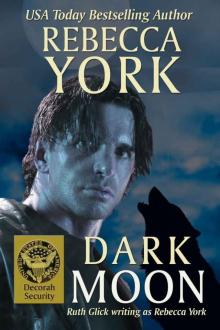 DARK MOON (Decorah Security)
DARK MOON (Decorah Security)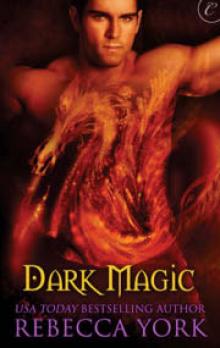 Shattered Magic
Shattered Magic Hot off the Presses
Hot off the Presses Her Baby's Father
Her Baby's Father Hunting Moon (Decorah Security Series, Book #11): A Paranormal Romantic Suspense Novel
Hunting Moon (Decorah Security Series, Book #11): A Paranormal Romantic Suspense Novel AMBUSHED
AMBUSHED Betrayed
Betrayed Riley's Retribution
Riley's Retribution Cradle and All
Cradle and All BRIDAL JEOPARDY
BRIDAL JEOPARDY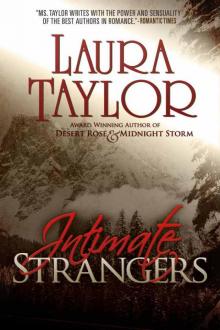 Intimate Strangers
Intimate Strangers Ghost Moon
Ghost Moon